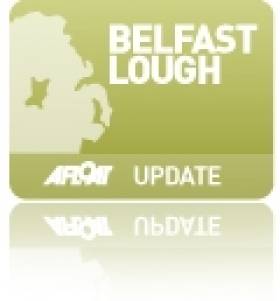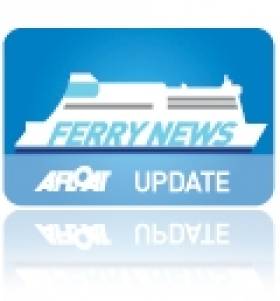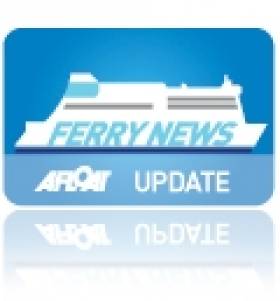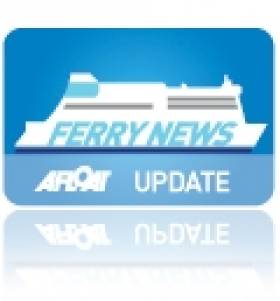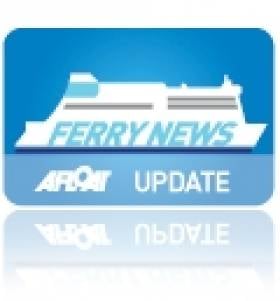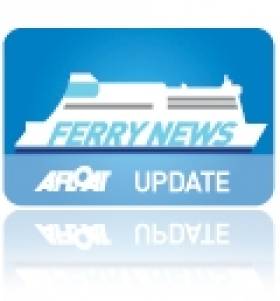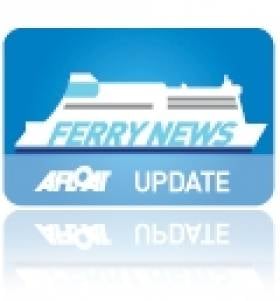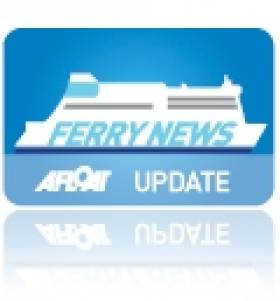Displaying items by tag: Stena Feronia
MIAB Report into Belfast Lough Collision Finds Fault on Both Sides
#BELFAST LOUGH - Inappropriate actions by the bridge teams of two vessels contributed to their collision in Belfast Lough earlier this year, according to the official report into the incident by the UK's Marine Accident Investigation Branch (MIAB).
BBC News reports on the MIAB's findings in its investigation into the collision of the container ship Union Moon and passenger ferry Stena Feronia on 7 March last, which resulted in substantial damage to both vessels.
The Stena Feronia, which was heading into port en route from Birkenhead, made contact with the Union Moon near the Fairway Buoy about 1km from the shore between Carrickfergus and Helen's Bay.
The report found that the Union Moon's captain made an inappropriate course alteration on leaving port while under the influence of alcohol which put it in the direction of the inbound ferry.
The captain of the Union Moon, 55-year-old Miroslaw Pozniak, was subsequently arrested and charged with 'excess alcohol by the master of a ship', and later sentenced to a year's imprisonment.
However, the MIAB also determined that the decision by the master of the Stena Feronia to leave his bridge "at a time when his ship was effectively under pilotage and approaching the harbour limit of Belfast, with a converging outbound vessel, was unwise".
In addition, there was a delay on the part of the ferry's pilotage exemption certificate (PEC) holder in taking corrective action due to a lack of "precautionary thought" and "appreciation of the limited time available", while sub-standard VHF communications on the Stena Feronia were also called into question.
Meanwhile, the MIAB report added that they was a lack of clear guidance regarding traffic flow around the Fairway Buoy.
The incident was the second involving excess alcohol by a ship's master in UK waters in six months, following the beaching of the container vessel Karin Schepers on the Cornish coast in August 2011.
The complete MAIB report into the incident is available HERE.
#FERRY NEWS – A £4m upgrade of Stena Line's Belfast-Birkenhead (Liverpool) sisters has been completed at Harland & Wolff. The work was carried on the pair of 27,000 tonnes ships by Newry based specialist marine outfitters MJM Marine, writes Jehan Ashmore.
Work on the 980-passenger vessels Stena Mersey and Stena Lagan began in March and ended last month. During that timeframe the Stena Feronia which was in a collision with a cargoship in Belfast Lough, was deployed to cover the overhaul of the sisters, now sporting Stena Line livery.
The investment programme introduced on board entails facilities such as a lounge pod-area featuring several iMacs, a trucker's lounge, free wi-fi and a bar & grill and a restaurant.
In addition the refurbishment has improved customer experience with the inclusion of an improved shop, improved guest services, and cinema offering guests free movies during the north Irish Sea crossing.
The pair built by Visentini, the Italian shipbuilder based near Venice, can handle 2,662 freight lane metres are now owned by a subsidiary of Stena Line, in the form of Stena RoRo which purchased the vessels from a German bank.
Beforehand the ferries were part of Epic Shipping which chartered them in turn to DFDS Seaways. The Danish owned operator's short-lived Irish Sea route network venture was sold last year to Stena which included the sisterships.
Stena RoRo also purchased the Visentini built ro-pax Watling Street and also from the same yard the former Celtic Link ro-pax Norman Voyager, which is currently back on its original Portsmouth-Le Havre route running on charter to French ferry operator LD Lines.
Meanwhile Celtic Link's existing Rosslare-Cherbourg route vessel Celtic Horizon, is on a five year charter from an offshoot of the same Italian shipbuilder and again is another vessel of the successful ro-pax design.
Belfast Lough Collision Captain Pleads Guilty to Crash Damage
#FERRY NEWS - The captain of a cargo ship that crashed into a passenger ferry in Belfast Lough last month has pleaded guilty to four charges related to the incident, RTÉ News reports.
More than $1 million of damage was caused when the cargo vessel Union Moon collided with the Stena Feronia on the evening of 7 March, as previously reported on Afloat.ie.
The 27,000-tonne ferry was on its way from Birkenhead in Merseyside to Belfast when it was struck by the cargo ship, captained by Miroslaw Pozniak, about a mile-and-a-half from the shore between Carrickfergus and Helen's Bay.
Fifty-five year old Pozniak, from Poland, was arrested shortly after the incident, charged with 'excess alcohol by the master of a ship'.
At a second hearing in Downpatrick Crown Court he also pleaded guilty to charges brought by the Maritime and Coastguard Agency (MCA) that include failing to keep a proper lookout, failing to safely navigate the lough, and causing serious damage to both vessels.
However, BBC News reports that he denied the charges of failing to follow safety rules and proper watch keeping arrangements, and that these will remain 'on the books' and will not be proceeded with.
Pozniak was released on continuing bail before sentencing at the end of next month. He could face up to two years in prison.
Collision Captain's Case Sent to Crown Court
#FERRY NEWS - BBC News reports that the captain of the cargo ship that collided with a passenger ferry in Belfast Lough could face up to two years in prison as his case has been sent to Crown Court.
Miroslaw Pozniak, 55, pleaded guilty on Friday to the charge of 'excess alcohol by the master of a ship' after the cargo vessel Union Moon collided with the Stena Feronia close to the Fairway buoy on Wednesday.
Both vessels were substantially damaged in the incident but there are no reports of injuries.
Newtownards Court heard yesterday that Pozniak has been fired by his employer. He will remain in custody until 20 March when the judge will again consider bail.
#FERRY NEWS - The captain of the cargo ship Union Moon, who was arrested after his vessel collided with a passenger ferry in Belfast Lough, has been charged with 'excess alcohol by the master of a ship'.
BBC News reports that the 55-year-old was set to appear in court today, following his arrest yesterday.
No one was injured in the incident on Wednesday, when the Union Moon collided with the Stena Feronia close to the Fairway buoy between Carrickfergus and Helen's Bay. Both vessels were substantially damaged.
The cargo ship, which was carrying 2,000 tonnes of aggregate, was brought back to Belfast. Philip McNamara of the Donaghdee lifeboat confirmed that a large section of her bow was missing.
Meanwhile, engineers from Stena Irish Sea are assessing the damage to their vessel to determine how long it will be out of service. The Stena Feronia sails the route from Belfast to Birkenhead in Merseyside.
The Maritime and Coastguard Agency, the Marine Accident Investigation Branch and the PSNI are all involved in the investigation.
BBC News has more on the story HERE.
- Ferry news
- collision
- Belfast Lough
- cargo ship
- Union Moon
- captain
- charged
- drink
- excess alcohol
- ferry
- Stena Feronia
- Birkenhead
- Merseyside
- court
- Fairway buoy
- Carrickfergus
- Helen's Bay
- Philip McNamara
- Donaghdee
- Lifeboat
- Stena Irish Sea
- Maritime and Coastguard Agency
- Marine Accident Investigation Branch
- psni
Captain Arrested after Belfast Lough Collision
#FERRY NEWS - The captain of the 1,500 tonnes cargo vessel Union Moon which was involved in a collision with the passenger ferry Stena Feronia in Belfast Lough last night, has been arrested by police, according to BBC News.
An investigation is under way after the accident which happened about a mile and a half from shore between Carrickfergus and Helen's Bay.
The 27,000 tonnes Stena Feronia was on its way from Birkenhead, Merseyside, to Belfast when the collision happened at about 19:45 GMT.
Coxswain of Donaghadee Lifeboat Philip McNamara said the Union Moon, was brought back to Belfast.
No one was injured, but both vessels were substantially damaged. The Maritime and Coastguard Agency (MCA) said both captains had been breathalysed, to read more about this story click HERE.
Vessels Collide in Belfast Lough
#FERRY NEWS – A passenger ferry and cargo vessel collided in Belfast Lough last night and there are no reports of any injuries. The incident happened close to the Fairway buoy about a mile and a half from shore between Carrickfergus and Helen's Bay, according to BBC News.
It is understood that the ferry Stena Feronia (1997/21,856grt) has now docked at the Stena terminal. The other vessel - a cargo ship, the Union Moon (1985/1,543grt)- was accompanied by the coastguard as it was brought back to Belfast.
The ferry was on its way from Birkenhead, Merseyside, to Belfast when the collision happened, to read more on this story click HERE.
Stena Superfast VII Departs Poland for New Belfast-Cairnryan Route
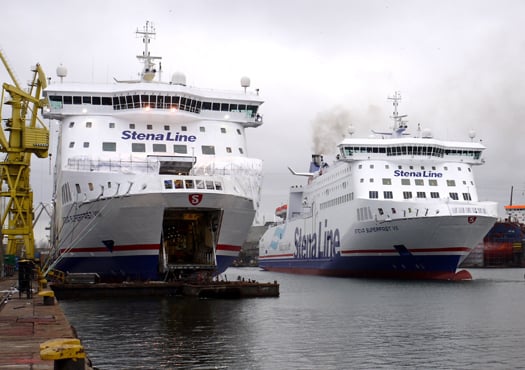
The New Superfast leaves Gdansk
The 30,285grt newcomer and her sister Stena Superfast VIII will become the largest ever ferries running on the North Channel , though prior to entering service on 21 November, they will undertake berthing trials and crew training.
For the next two-years the sisters are on charter from Scandinavian operators Tallink, and are to operate the new 2 hour 15 minute route with 12 crossings daily. The ten-deck ships can carry up to 1200 passengers, 660 cars or 110 freight units. The sisters will be re-gistered in their new homport of Belfast.
The relocation of Scottish ferry port and the introduction of the Superfast sisters will replace the existing pair of conventional ferry tonnage, Stena Caledonia and Stena Navigator (1984/15,229gt) the latter vessel is believed to be sold. In addition HSS sailings will cease causing the HSS Stena Voyager to become redundant, she was the second of the trio of pioneering HSS 1500 craft built.
When Stena Superfast VII departed Gdansk, she passed the Stena Vision which operates Stena Line's Karlskrona-Gdynia route, the Baltic Sea city lies to the west of Gdansk. Also in Gdansk was the Stena Feronia, the former Irish Sea serving Visentini built ro-pax Dublin Seaways, which was operated albeit briefly by DFDS Seaways last year on the Dublin-(Birkenhead) Liverpool service.
She served under her new Scandinavian owners but the firm's first foray into the Irish market lasted a mere six months. DFDS Seaways sold their Irish Sea network to Stena Line (to read report click HERE) with the exception of their Dublin-Birkenhead service which closed. In addition the Dublin-Heysham freight-only route which closed until re-opened by Seatruck Ferries. The route is currently served by Anglia Seaways, the freightferry which DFDS previously used on the route is on charter to the operator.
- DFDS Seaways
- Baltic Sea
- Stena Line
- Ports and Shipping News
- Seatruck Ferries
- North Channel
- Stranraer
- Dublin Seaways
- Ferry news
- Tallink
- Loch Ryan Port
- HSS Stena Voyager
- Stena Caledonia
- Stena Navigator
- Belfast Lough News
- HSS
- Visentini ropax
- BelfastCairnryan
- Stena Superfast VII
- Stena Superfast VIII
- Stena Superfast
- Superfast Sisters
- North Channel ferry routes
- Stena Feronia
- LRP
- BirkenheadBelfast
- DublinBirkenhead


























